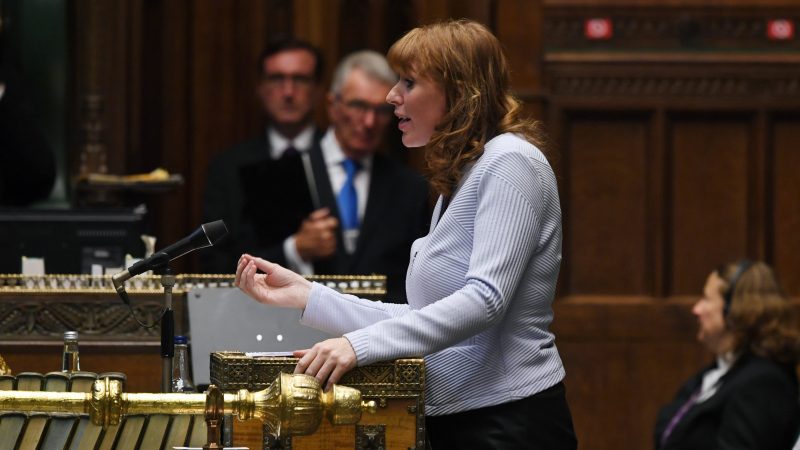
Angela Rayner has called on the government to bring forward its promised employment bill to enshrine the right to work flexibly in law post-Covid after Rishi Sunak endorsed people returning to the office as “really beneficial”.
Commenting after the Chancellor told LinkedIn News that “for young people in particular being able to physically be in an office is valuable”, Rayner said: “The British people want to be able to work flexibly after Covid.”
“The Chancellor seems to be the only person who doesn’t recognise the benefits that flexible working can deliver to workers and employers alike,” the Shadow Future of Work Secretary and deputy Labour leader said this afternoon.
Ministers removed the formal advice to work from home last month, and guidance now states that they “expect and recommend a gradual return over the summer”.
“The Chancellor should check the manifesto that he was elected on in 2019 which committed the government to making flexible working the default. The Chancellor and his colleagues should bring forward the government’s promised employment bill so we can enshrine the right to flexible working in law,” Rayner added.
“Labour will give all workers the right to flexible working so everyone can enjoy the benefits of flexible working and make their own minds up about what works for them so that work fits around our lives instead of dictating our lives.”
The opposition party launched its campaign for a “new deal for working people” last week. Rayner has said that Labour will “fundamentally change working practices for the better” and “make flexible working a force for good” for everyone.
Keir Starmer wrote exclusively for LabourList to explain why the party has launched its new campaign, which is based on five principles: “security at work”; “quality jobs”; “a fairer economy”; “opportunity for all”; and “work that pays”.
Employees currently have the right to request flexible working, but businesses are only obliged to handle the requests in a ‘reasonable’ manner and do not have to accept the request even if such an arrangement is possible.
Recent research from the TUC found that 82% of workers want to work flexibly in the future, rising to 87% among female employees. Yet 71% of flexible working requests were rejected in 2020, up from 53% the previous year.
The Tories promised to bring forward an employment bill in 2019, and the Conservative general election manifesto pledged to “encourage flexible working and consult on making it the default unless employers have good reasons not to”.
The government’s flexible working taskforce urged permanent job flexibility for workers earlier this year, with co-chair Peter Cheese describing the pandemic as an “opportunity to shift ways of working, which have barely changed for generations”.
Downing Street confirmed in June that the government is considering introducing a right for employees to request home working specifically, and a spokesperson said a flexible working task force was examining how best to proceed.
But they stressed that there would be no legal right to work from home, reporting that the Prime Minister Boris Johnson still believes that there are benefits to working in the office, such as in-person collaboration with colleagues.
A 2019 government study found that jobs advertised flexibly attracted 30% more applicants than those that did not. RCM research showed 76% of midwives who had left their jobs could be persuaded to return if given the chance to work flexibly.




More from LabourList
‘The Sherriff of Wild Westminster: what must change in elections bill’
‘The hope that kills you’: Reflections from the final day in Gorton and Denton
MPs, union leaders and organisations react to ‘bruising’ Gorton and Denton result